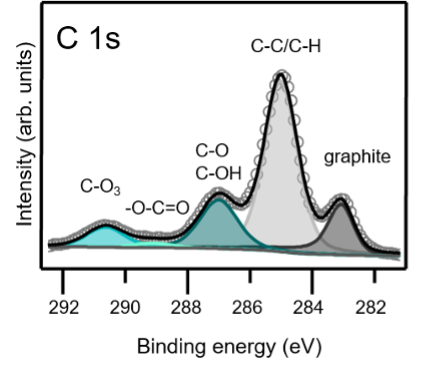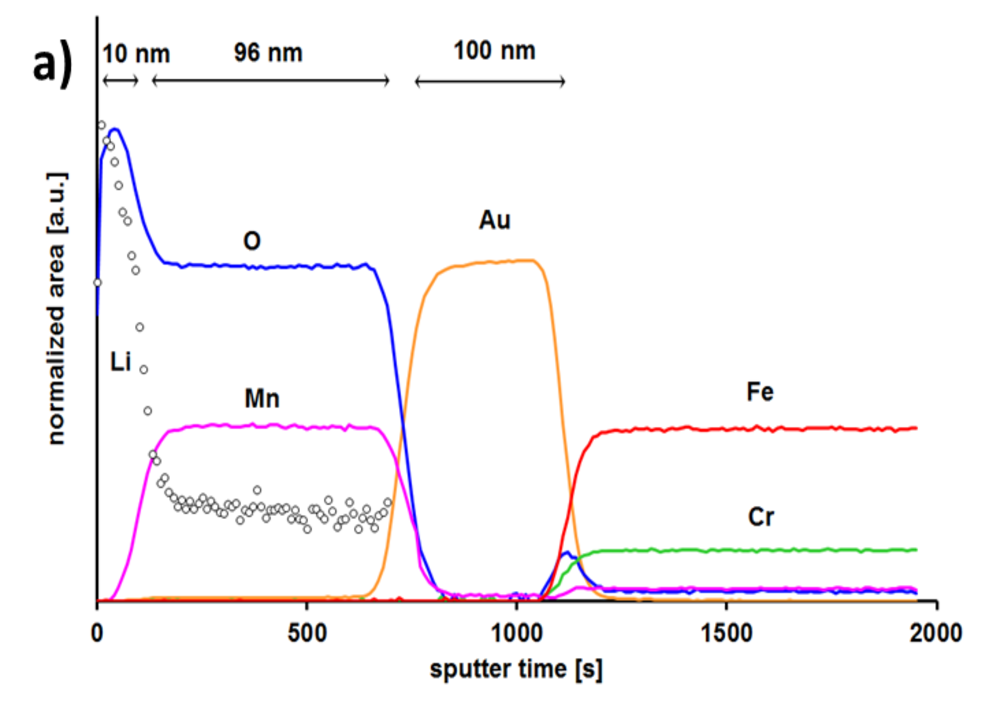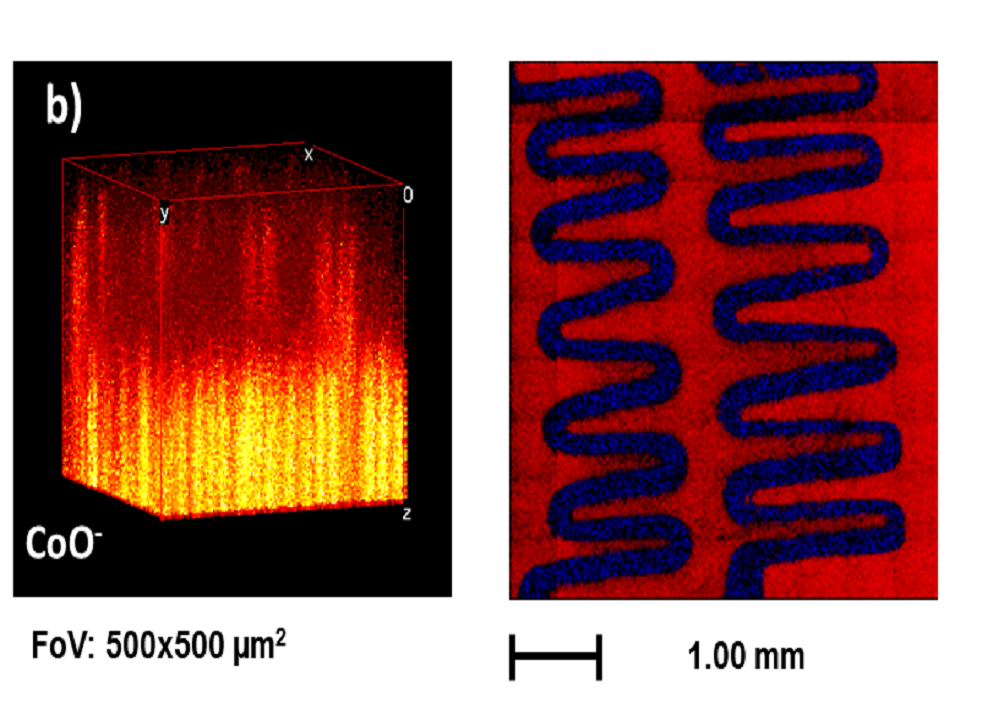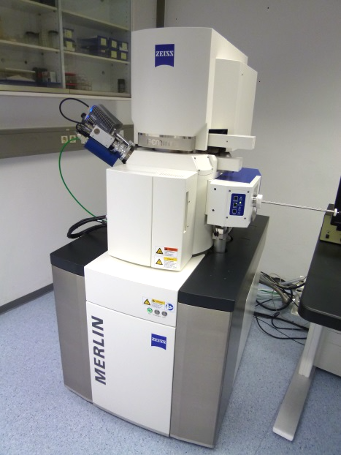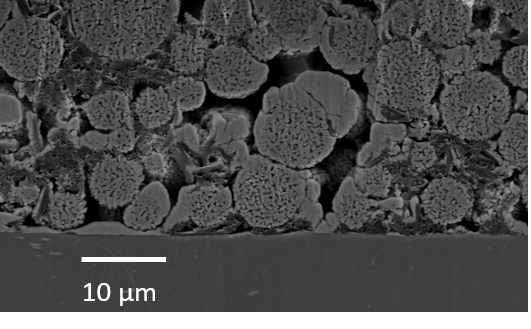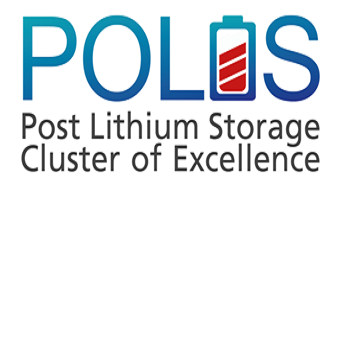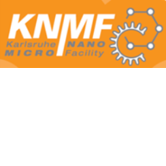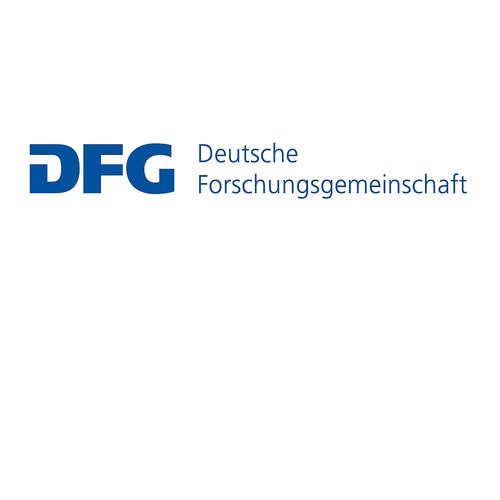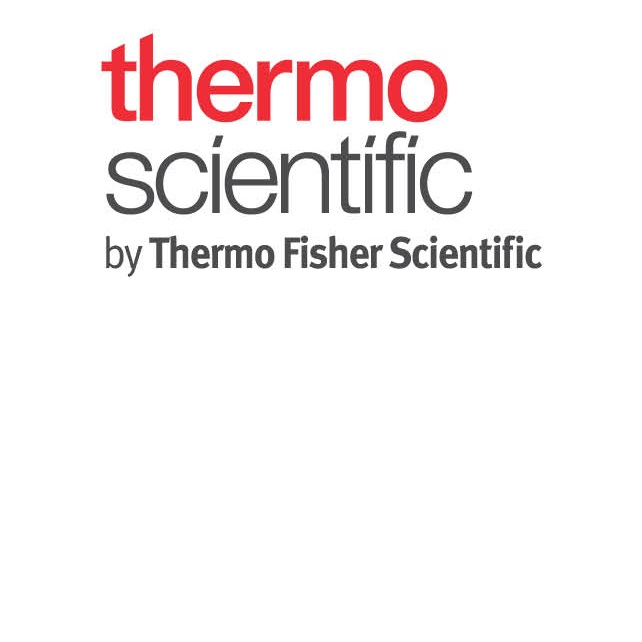Interface Analytics
Our Group Surface & Interface Analysis uses X-ray photoelectron spectroscopy (XPS) and Time-of-flight mass spectrometry (ToF-SIMS) to investigate the surface chemistry and physics of material and electrode interfaces. Our work is complemented by secondary electron microscopy to acquire morphological information about a sample surface or its porosity using cross-section analysis.
XPS is the most widely used surface analysis technique that provides both qualitative and quantitative insights on the chemical composition and chemical states, i.e. the chemical environment of an element, in a non-destructive manner. XPS is highly surface-sensitive, probing merely the first 10 nanometres of a sample surface with conventional instruments. Argon-ion and argon-clusters can be used to remove the surface layer-by-layer (so-called sputtering), to generate sputter depth profiles.
Since more than a decade our group collaborates on a scientific basis with Thermo Fisher Scientific Application Lab (East Grinstead, England). Since 2009 we are a K-Alpha-Demo-Lab.
Equipment:
-
Thermo Fisher Scientific K-Alpha XPS-Spectrometer with integrated glovebox for moisture- and air-free sample transfer
-
Thermo Fisher Scientific K-Alpha+ XPS-Spectrometer equipped with a Ar-cluster source
-
VG ESCA5 multimethod spectrometer equipped with a Thermo Fisher Scientific Alpha 110 electron energy analyser.
Example from the field of electrochemistry and battery research
XPS is frequently applied in electrochemistry for the characterisation of the electrode-electrolyte interface on corrosion processes. Some interfaces form passivation layers that are surface layers that protect the underlying material from parasitic reactions. For instance, many metals form a passivation layer upon reaction with oxygen. On the other hand, continuous corrosion occurs as a result of insufficient passivation and is commonly observed for iron for instance that forms rust in presence of oxygen and moisture. Other metals such as aluminium for a dense and protective oxide layer that curtails any further reaction with oxygen after a certain layer thickness was reached.
As prominent subdomain in electrochemistry, battery research investigates for example the formation of the so-called ‘solid electrolyte interphase’ (SEI) that is responsible for long cycle life in Li-Ion batteries. The SEI is formed during decomposition reactions of the electrolyte at the electrode interface. The resulting products are partly insoluble and deposit on the electrode surface. The resulting layer can prevent further degradation reactions, while also protecting the electrode material underneath on following charge-discharge cycles. In our group we investigate the interphases formed in different electrolyte systems with the aim to understand the SEI formation in more detail and to influence the formation process through deliberate choice of electrolyte additives. In Figure 1, a typical spectrum of the chemical environment of carbon is shown. Different chemical functional groups appear at different binding energies, which allows a classification of into various organic and inorganic components that are present at the interface. Their relative intensities, i.e. the proportion to the overall signal, further allows us to assess the composition of the SEI layer, which has a direct impact on the degree of protection.
In more general terms, XPS is a powerful tool for material characterization of multicomponent systems, especially when in cases of layered structures. As a result of the above mentioned surface sensitivity of XPS, only the topmost layers are visible. In combination with sputter depths profiles, layers can be removed gradually, allowing to track the changes in chemical composition as a function of sputter time. This is shown in figure 2, where the concentration of selected elements changes as more layers are removed.
ToF-SIMS is a complex surface analytical technique that is available in only a number of labs worldwide. It is also a powerful tool to acquire complementary data to XPS, as it provides elemental and molecular information with high lateral and axial (depth) resolution.
In ToF-SIMS a focused, high-energetic primary ion beam is directed onto a surface causing the formation of monoatomic or molecular fragments to be formed where the beam hits the sample surface. These fragments are enter the gas phase and are directed into a time-of-flight mass analyser where fragments are counted and separated by their molecular mass. The fragmentation of compounds is characteristic and thus their mass spectrum allows conclusions about the compound it originated from.
The technique is highly surface sensitive with a information depths of around 5 nm. The lateral resolution is obtained by scanning the ion beam across the sample surface. On structured surfaces, the mass spectrum in different locations of the sample will thus look different, dependent on the chemical composition in that particular spot. ToF-SIMS has a large range of applications, including analysis of polymers, self-assembling monolayers on a substrate and surfaces in technical applications (e.g. abrasion of materials). Another popular application is the depth profile and 3D imaging analysis, using a combination of primary ion beam and sputtering by cesium-, oxygen- or Ar-ion clusters.
For surface sensitive samples, the spectrometer can be accessed via atmosphere contact free sample transport. We perform ToF-SIMS on a rich variety of different topics, including battery research, organic compounds, semi-conductors or hydrogen-diffusion in materials to name but a few examples from our portfolio.
Equipment:
-
ION-TOF GmbH ToF.SIMS 5 Spektrometer ausgestattet mit Ar-Clusterionenquelle
Scanning electron microscopy (SEM; Fig. 3) is used to determine the topology of a sample with high spatial resolution. Compared to an (optical) light microscope, that reaches up to 1.500 x magnification, SEM reaches magnifications of up to 100.000 x and higher resolution. For instance, a virus with size between 30 to 250 nm or proteins in the size range of 10 nm can be readily visualized. Because of the interactions of the electrons with matter, an elemental contrast is can also be achieved, allowing to distinguish areas of different chemical compositions. The instrument is equipped with a detector for energy-dispersive X-ray spectroscopy (EDX/EDS) that is commonly used to distinguish the distribution of elements in a sample for easily.
For our battery research we use SEM frequently to analyse (powder) samples in the size range from the low nanometer (nm) to mid micrometer (µm) range. In addition, SEM is a commonly used tool to prepare images of electrode coatings prior and after aging in a battery. Our lab uses ion milling as an additional tool to generate cross-sections of samples to learn details about porosity and (electrode) structure (Fig. 4).
Equipment:
-
Zeiss GmbH FE-SEM MERLIN scanning electron microscope
-
PECS II, Model 685 (Gatan)
Projects
Projects in the framework of our Cluster of Excellence POLiS (Projektnummer 390874152)
-
Analytical approach for investigating component degradation
-
Synergies and Differences at the Alkali-Metal/Electrolyte Interface
-
From surface & interphase phenomena to understanding the interplay of components in aluminium batteries
-
Electrolyte degradation in liquid electrolytes studied by gas chromatography and photoelectron spectroscopy
Potassium-Ion Batteries: Sustainable Strategies – „KIBSS“ (DFG Projekt 448719339)
The project targets new active materials to boost the storage of potassium ions and intents to find compatible liquid electrolyte systems. The research project is conducted jointly with the Institute for Complex Materials at the Leibniz Institute for Solid State and Materials Research (IFW) Dresden e.V.
The IAM-ESS contributes with the characterization of the electrode-electrolyte interface that is responsible for the stability and cycle life of the battery. In particular, in systems with large potential differences between anode and cathode, electrolyte decomposition reactions can represent a culprit to long cycle life and can cause rapid capacity fading. In order to address this problem, the electrolyte properties need to be gradually revised and improved to achieve a high interfacial stability and reduce the degree of side reactions to a minimum. In parallel, novel anode and cathode materials will be developed for potassium storage under special consideration of sustainable synthetic approaches and benign as well as abundant raw material selection (e.g. using iron instead of cobalt or cellulose as renewable feedstock).
Karlsruhe Nano Micro Facility for Information-driven Material Structuring and Characterization (KNMFi)
Within the KNMFi network we perform surface analysis in a diverse range of topics. KNMFi is open for projects from academia and industry, either national or international. KNMFi connects more than 20 different technologies at KIT in the areas Micro- and Nanostructuring, as well as Microscopy and Spectroscopy. Project proposals can be submitted to KNMFi. More information is provided under following link https://www.knmf.kit.edu/access.php.
Ghamlouche, A.; Müller, M.; Jeschull, F.; Maibach, J.
2022. Journal of The Electrochemical Society, 169 (2), Art.-Nr.: 020541. doi:10.1149/1945-7111/ac4cd3
Payandeh, S.; Njel, C.; Mazilkin, A.; Teo, J. H.; Ma, Y.; Zhang, R.; Kondrakov, A.; Bianchini, M.; Brezesinski, T.
2022. Advanced Materials Interfaces, 10 (3), Art.-Nr.: 2201806. doi:10.1002/admi.202201806
He, J.; Melinte, G.; Darma, M. S. D.; Hua, W.; Das, C.; Schökel, A.; Etter, M.; Hansen, A.-L.; Mereacre, L.; Geckle, U.; Bergfeldt, T.; Sun, Z.; Knapp, M.; Ehrenberg, H.; Maibach, J.
2022. Advanced Functional Materials, 32 (46), 2207937. doi:10.1002/adfm.202207937
Mereacre, V.; Stüble, P.; Trouillet, V.; Ahmed, S.; Volz, K.; Binder, J. R.
2022. Advanced Materials Interfaces, 10 (2), Art.-Nr.: 2201324. doi:10.1002/admi.202201324
Gehrlein, L.; Leibing, C.; Pfeifer, K.; Jeschull, F.; Balducci, A.; Maibach, J.
2022. Electrochimica Acta, 424, Art.-Nr.: 140642. doi:10.1016/j.electacta.2022.140642
Julius, L. A. N.; Matter, L.; Schuergers, N.; Lützenkirchen, J.; Trouillet, V.; Gil-Díaz, T.; Mamleyev, E. R.; Wilde, A.; Badilita, V.; Korvink, J. G.
2022. Acta Biomaterialia, 155, 386–399. doi:10.1016/j.actbio.2022.10.035
Gehrlein, L.; Njel, C.; Jeschull, F.; Maibach, J.
2022. ACS Applied Energy Materials, 5 (9), 10710–10720. doi:10.1021/acsaem.2c01454
Dönges, I.; Büschges, M. I.; Njel, C.; Schneider, J. J.
2022. Dalton Transactions, 51 (36), 13725–13733. doi:10.1039/D2DT02155B
Córdoba, R.; Goclon, J.; Sarapulova, A.; Fu, Q.; Maibach, J.; Dsoke, S.; Fauth, F.; Kuhn, A.; García-Alvarado, F.
2022. Applied Research, 2 (1), Art.Nr. e202200052. doi:10.1002/appl.202200052
Radinger, H.; Trouillet, V.; Bauer, F.; Scheiba, F.
2022. ACS Catalysis, 12 (10), 6007–6015. doi:10.1021/acscatal.2c00334
Welle, A.
2022, July 26. doi:10.35097/583
Melder, T.; Lindemann, P.; Welle, A.; Trouillet, V.; Heißler, S.; Nazaré, M.; Selbach, M.
2022. Cold Spring Harbor Laboratory. doi:10.1101/2022.04.03.486868
Melder, F. T.; Lindemann, P.; Welle, A.; Trouillet, V.; Heißler, S.; Nazaré, M.; Selbach, M.
2022. ChemMedChem, 17 (19), e202200346. doi:10.1002/cmdc.202200346
Stockhausen, R.; Gehrlein, L.; Müller, M.; Bergfeldt, T.; Hofmann, A.; Müller, F. J.; Maibach, J.; Ehrenberg, H.; Smith, A.
2022. Journal of Power Sources, 543, Article no: 231842. doi:10.1016/j.jpowsour.2022.231842
Bothe, A.; Gehrlein, L.; Fu, Q.; Li, C.; Maibach, J.; Dsoke, S.; Balducci, A.
2022. Batteries & Supercaps, 5 (8), Art.Nr.: e20220015. doi:10.1002/batt.202200152
Zhao, H.; Fu, Q.; Luo, X.; Wu, X.; Indris, S.; Bauer, M.; Wang, Y.; Ehrenberg, H.; Knapp, M.; Wei, Y.
2022. Energy Storage Materials, 50, 464–472. doi:10.1016/j.ensm.2022.05.048
Jemai, R.; Djebbi, M. A.; Hussain, N.; Yang, B.; Hirtz, M.; Trouillet, V.; Ben Rhaiem, H.; Ben Haj Amara, A.
2022. New Journal of Chemistry, 46 (29), 13880–13895. doi:10.1039/D2NJ01844F
Shi, H.; Azmi, R.; Han, L.; Tang, C.; Weisenburger, A.; Heinzel, A.; Maibach, J.; Stüber, M.; Wang, K.; Müller, G.
2022. Corrosion Science, 201, Art.-Nr.: 110275. doi:10.1016/j.corsci.2022.110275
Zhao, Z.; Darma, M. S. D.; Tian, G.; Luo, X.; Zhao, E.; Wang, B.-T.; Zhao, J.; Hua, W.; Zhao, X.; Wang, Y.; Ehrenberg, H.; Dsoke, S.
2022. Chemical Engineering Journal, 444, Article no: 136608. doi:10.1016/j.cej.2022.136608
Luo, X.
2022, April 13. Karlsruher Institut für Technologie (KIT). doi:10.5445/IR/1000144708
He, J.; Das, C.; Yang, F.; Maibach, J.
2022. Electrochimica acta, 411, Art.-Nr.: 140038. doi:10.1016/j.electacta.2022.140038
Savin, R.; Benzaamia, N.-O.; Njel, C.; Pronkin, S.; Blanck, C.; Schmutz, M.; Boulmedais, F.
2022. Materials Advances, 3 (4), 2222–2233. doi:10.1039/d1ma01193f
Büschges, M. I.; Trouillet, V.; Schneider, J. J.
2022. Journal of Materials Chemistry C, 10 (14), 5447–5457. doi:10.1039/D2TC00285J
Källquist, I.; Ericson, T.; Lindgren, F.; Chen, H.; Shavorskiy, A.; Maibach, J.; Hahlin, M.
2022. ACS applied materials & interfaces, 14 (5), 6465–6475. doi:10.1021/acsami.1c12465
Bauer, M.; Pfeifer, K.; Luo, X.; Radinger, H.; Ehrenberg, H.; Scheiba, F.
2022. ChemElectroChem, 9 (8), Art.Nr. e202101434. doi:10.1002/celc.202101434
Varadharajan, D.; Nayani, K.; Zippel, C.; Spuling, E.; Cheng, K. C.; Sarangarajan, S.; Roh, S.; Kim, J.; Trouillet, V.; Bräse, S.; Abbott, N. L.; Lahann, J.
2022. Advanced Materials, 34 (9), Art.-Nr.: 2108386. doi:10.1002/adma.202108386
Wang, L.; Jankowski, P.; Njel, C.; Bauer, W.; Li, Z.; Meng, Z.; Dasari, B.; Vegge, T.; Lastra, J. M. G.; Zhao-Karger, Z.; Fichtner, M.
2022. Advanced Science, 9 (7), Art.-Nr.: 2104605. doi:10.1002/advs.202104605
Lin, L.; Wang, K.; Sarkar, A.; Njel, C.; Karkera, G.; Wang, Q.; Azmi, R.; Fichtner, M.; Hahn, H.; Schweidler, S.; Breitung, B.
2022. Advanced Energy Materials, 12 (8), Art.-Nr. 2103090. doi:10.1002/aenm.202103090
Tuvshindorj, U.; Trouillet, V.; Vasilevich, A.; Koch, B.; Vermeulen, S.; Carlier, A.; Alexander, M. R.; Giselbrecht, S.; Truckenmüller, R.; Boer, J. de
2022. Small, 18 (10), Art.Nr. 2105704. doi:10.1002/smll.202105704
Fu, Q.; Wu, X.; Luo, X.; Indris, S.; Sarapulova, A.; Bauer, M.; Wang, Z.; Knapp, M.; Ehrenberg, H.; Wei, Y.; Dsoke, S.
2022. Advanced functional materials, 32 (16), Art.Nr.: 2110674. doi:10.1002/adfm.202110674
Allgayer, F.; Maibach, J.; Jeschull, F.
2022. ACS applied energy materials, 5 (1), 1136–1148. doi:10.1021/acsaem.1c03491
Beichel, W.; Skrotzki, J.; Klose, P.; Njel, C.; Butschke, B.; Burger, S.; Liu, L.; Thomann, R.; Thomann, Y.; Biro, D.; Thiele, S.; Krossing, I.
2022. Batteries and Supercaps, 5 (2), Art. Nr.: e202100347. doi:10.1002/batt.202100347
Hu, H.; Moghadamzadeh, S.; Azmi, R.; Li, Y.; Kaiser, M.; Fischer, J. C.; Jin, Q.; Maibach, J.; Hossain, I. M.; Paetzold, U. W.; Abdollahi Nejand, B.
2022. Advanced Functional Materials, 32 (12), Art.-Nr.: 2107650. doi:10.1002/adfm.202107650
2022
Ghamlouche, A.; Müller, M.; Jeschull, F.; Maibach, J.
2022. Journal of The Electrochemical Society, 169 (2), Art.-Nr.: 020541. doi:10.1149/1945-7111/ac4cd3
Payandeh, S.; Njel, C.; Mazilkin, A.; Teo, J. H.; Ma, Y.; Zhang, R.; Kondrakov, A.; Bianchini, M.; Brezesinski, T.
2022. Advanced Materials Interfaces, 10 (3), Art.-Nr.: 2201806. doi:10.1002/admi.202201806
Mereacre, V.; Stüble, P.; Trouillet, V.; Ahmed, S.; Volz, K.; Binder, J. R.
2022. Advanced Materials Interfaces, 10 (2), Art.-Nr.: 2201324. doi:10.1002/admi.202201324
Julius, L. A. N.; Matter, L.; Schuergers, N.; Lützenkirchen, J.; Trouillet, V.; Gil-Díaz, T.; Mamleyev, E. R.; Wilde, A.; Badilita, V.; Korvink, J. G.
2022. Acta Biomaterialia, 155, 386–399. doi:10.1016/j.actbio.2022.10.035
Gehrlein, L.; Njel, C.; Jeschull, F.; Maibach, J.
2022. ACS Applied Energy Materials, 5 (9), 10710–10720. doi:10.1021/acsaem.2c01454
Dönges, I.; Büschges, M. I.; Njel, C.; Schneider, J. J.
2022. Dalton Transactions, 51 (36), 13725–13733. doi:10.1039/D2DT02155B
Córdoba, R.; Goclon, J.; Sarapulova, A.; Fu, Q.; Maibach, J.; Dsoke, S.; Fauth, F.; Kuhn, A.; García-Alvarado, F.
2022. Applied Research, 2 (1), Art.Nr. e202200052. doi:10.1002/appl.202200052
Radinger, H.; Trouillet, V.; Bauer, F.; Scheiba, F.
2022. ACS Catalysis, 12 (10), 6007–6015. doi:10.1021/acscatal.2c00334
Melder, T.; Lindemann, P.; Welle, A.; Trouillet, V.; Heißler, S.; Nazaré, M.; Selbach, M.
2022. Cold Spring Harbor Laboratory. doi:10.1101/2022.04.03.486868
Melder, F. T.; Lindemann, P.; Welle, A.; Trouillet, V.; Heißler, S.; Nazaré, M.; Selbach, M.
2022. ChemMedChem, 17 (19), e202200346. doi:10.1002/cmdc.202200346
Stockhausen, R.; Gehrlein, L.; Müller, M.; Bergfeldt, T.; Hofmann, A.; Müller, F. J.; Maibach, J.; Ehrenberg, H.; Smith, A.
2022. Journal of Power Sources, 543, Article no: 231842. doi:10.1016/j.jpowsour.2022.231842
Bothe, A.; Gehrlein, L.; Fu, Q.; Li, C.; Maibach, J.; Dsoke, S.; Balducci, A.
2022. Batteries & Supercaps, 5 (8), Art.Nr.: e20220015. doi:10.1002/batt.202200152
Zhao, H.; Fu, Q.; Luo, X.; Wu, X.; Indris, S.; Bauer, M.; Wang, Y.; Ehrenberg, H.; Knapp, M.; Wei, Y.
2022. Energy Storage Materials, 50, 464–472. doi:10.1016/j.ensm.2022.05.048
Jemai, R.; Djebbi, M. A.; Hussain, N.; Yang, B.; Hirtz, M.; Trouillet, V.; Ben Rhaiem, H.; Ben Haj Amara, A.
2022. New Journal of Chemistry, 46 (29), 13880–13895. doi:10.1039/D2NJ01844F
Shi, H.; Azmi, R.; Han, L.; Tang, C.; Weisenburger, A.; Heinzel, A.; Maibach, J.; Stüber, M.; Wang, K.; Müller, G.
2022. Corrosion Science, 201, Art.-Nr.: 110275. doi:10.1016/j.corsci.2022.110275
Zhao, Z.; Darma, M. S. D.; Tian, G.; Luo, X.; Zhao, E.; Wang, B.-T.; Zhao, J.; Hua, W.; Zhao, X.; Wang, Y.; Ehrenberg, H.; Dsoke, S.
2022. Chemical Engineering Journal, 444, Article no: 136608. doi:10.1016/j.cej.2022.136608
Luo, X.
2022, April 13. Karlsruher Institut für Technologie (KIT). doi:10.5445/IR/1000144708
He, J.; Das, C.; Yang, F.; Maibach, J.
2022. Electrochimica acta, 411, Art.-Nr.: 140038. doi:10.1016/j.electacta.2022.140038
Savin, R.; Benzaamia, N.-O.; Njel, C.; Pronkin, S.; Blanck, C.; Schmutz, M.; Boulmedais, F.
2022. Materials Advances, 3 (4), 2222–2233. doi:10.1039/d1ma01193f
Büschges, M. I.; Trouillet, V.; Schneider, J. J.
2022. Journal of Materials Chemistry C, 10 (14), 5447–5457. doi:10.1039/D2TC00285J
Källquist, I.; Ericson, T.; Lindgren, F.; Chen, H.; Shavorskiy, A.; Maibach, J.; Hahlin, M.
2022. ACS applied materials & interfaces, 14 (5), 6465–6475. doi:10.1021/acsami.1c12465
Bauer, M.; Pfeifer, K.; Luo, X.; Radinger, H.; Ehrenberg, H.; Scheiba, F.
2022. ChemElectroChem, 9 (8), Art.Nr. e202101434. doi:10.1002/celc.202101434
Varadharajan, D.; Nayani, K.; Zippel, C.; Spuling, E.; Cheng, K. C.; Sarangarajan, S.; Roh, S.; Kim, J.; Trouillet, V.; Bräse, S.; Abbott, N. L.; Lahann, J.
2022. Advanced Materials, 34 (9), Art.-Nr.: 2108386. doi:10.1002/adma.202108386
Wang, L.; Jankowski, P.; Njel, C.; Bauer, W.; Li, Z.; Meng, Z.; Dasari, B.; Vegge, T.; Lastra, J. M. G.; Zhao-Karger, Z.; Fichtner, M.
2022. Advanced Science, 9 (7), Art.-Nr.: 2104605. doi:10.1002/advs.202104605
Lin, L.; Wang, K.; Sarkar, A.; Njel, C.; Karkera, G.; Wang, Q.; Azmi, R.; Fichtner, M.; Hahn, H.; Schweidler, S.; Breitung, B.
2022. Advanced Energy Materials, 12 (8), Art.-Nr. 2103090. doi:10.1002/aenm.202103090
Tuvshindorj, U.; Trouillet, V.; Vasilevich, A.; Koch, B.; Vermeulen, S.; Carlier, A.; Alexander, M. R.; Giselbrecht, S.; Truckenmüller, R.; Boer, J. de
2022. Small, 18 (10), Art.Nr. 2105704. doi:10.1002/smll.202105704
Fu, Q.; Wu, X.; Luo, X.; Indris, S.; Sarapulova, A.; Bauer, M.; Wang, Z.; Knapp, M.; Ehrenberg, H.; Wei, Y.; Dsoke, S.
2022. Advanced functional materials, 32 (16), Art.Nr.: 2110674. doi:10.1002/adfm.202110674
Allgayer, F.; Maibach, J.; Jeschull, F.
2022. ACS applied energy materials, 5 (1), 1136–1148. doi:10.1021/acsaem.1c03491
Beichel, W.; Skrotzki, J.; Klose, P.; Njel, C.; Butschke, B.; Burger, S.; Liu, L.; Thomann, R.; Thomann, Y.; Biro, D.; Thiele, S.; Krossing, I.
2022. Batteries and Supercaps, 5 (2), Art. Nr.: e202100347. doi:10.1002/batt.202100347
Hu, H.; Moghadamzadeh, S.; Azmi, R.; Li, Y.; Kaiser, M.; Fischer, J. C.; Jin, Q.; Maibach, J.; Hossain, I. M.; Paetzold, U. W.; Abdollahi Nejand, B.
2022. Advanced Functional Materials, 32 (12), Art.-Nr.: 2107650. doi:10.1002/adfm.202107650
Tagliavini, M.; Njel, C.; Pohl, J.; Richter, D.; Böhringer, B.; Schäfer, A. I.
2020. 12th International Congress on Membranes & Membrane Processes (ICOM 2020), Online, December 7–11, 2020
Hoffmann, R. C.; Sanctis, S.; Liedke, M. O.; Butterling, M.; Wagner, A.; Njel, C.; Schneider, J. J.
2020. Chemistry - a European journal, 27, 1–11. doi:10.1002/chem.202004270
Blank, T.; An, B. N.; Ishikawa, D.; Wurst, H. B.; Luh, M.; Scherer, T.; Trouillet, V.; Weber, M.
2020
Strauss, F.; Teo, J. H.; Maibach, J.; Kim, A.-Y.; Mazilkin, A.; Janek, J.; Brezesinski, T.
2020. ACS applied materials & interfaces, 12 (51), 57146–57154. doi:10.1021/acsami.0c18590
Blank, T.; Luh, M.; Leyrer, B.; Scherer, T.; Trouillet, V.; Pochert, M.; Wurst, H.; An, B. N.; Weber, M.; Ishikawa, D.
2020. 11th International Conference on Integrated Power Electronics Systems (CIPS 2020), 1–6, VDE Verlag
Fedorov, F. S.; Simonenko, N. P.; Trouillet, V.; Volkov, I. A.; Plugin, I. A.; Rupasov, D. P.; Mokrushin, A. S.; Nagornov, I. A.; Simonenko, T. L.; Vlasov, I. S.; Simonenko, E. P.; Sevastyanov, V. G.; Kuznetsov, N. T.; Varezhnikov, A. S.; Sommer, M.; Kiselev, I.; Nasibulin, A. G.; Sysoev, V. V.
2020. ACS applied materials & interfaces, 12 (50), 56135–56150. doi:10.1021/acsami.0c14055
Dietrich, P. M.; Gehrlein, L.; Maibach, J.; Thissen, A.
2020. Crystals, 10 (11), Article: 1056. doi:10.3390/cryst10111056
Wang, J.; Stenzel, D.; Azmi, R.; Najib, S.; Wang, K.; Jeong, J.; Sarkar, A.; Wang, Q.; Sukkurji, P. A.; Bergfeldt, T.; Botros, M.; Maibach, J.; Hahn, H.; Brezesinski, T.; Breitung, B.
2020. Electrochem, 1 (1), 60–74. doi:10.3390/electrochem1010007
Li, C.; Sarapulova, A.; Pfeifer, K.; Luo, X.; Maria Casati, N. P.; Welter, E.; Melinte, G.; Fu, Q.; Dsoke, S.
2020. ACS applied materials & interfaces, 12 (47), 52691–52700. doi:10.1021/acsami.0c15500
Jeschull, F.; Maibach, J.
2020. Electrochemistry communications, 121, Art.-Nr. 106874. doi:10.1016/j.elecom.2020.106874
Malekshahi Byranvand, M.; Behboodi-Sadabad, F.; Alrhman Eliwi, A.; Trouillet, V.; Welle, A.; Ternes, S.; Hossain, I. M.; Khan, M. R.; Schwenzer, J. A.; Farooq, A.; Richards, B. S.; Lahann, J.; Paetzold, U. W.
2020. Journal of materials chemistry / A, 8 (38), 20122–20132. doi:10.1039/d0ta06646j
Solheid, J. S.; Wunsch, T.; Trouillet, V.; Weigel, S.; Scharnweber, T.; Seifert, H. J.; Pfleging, W.
2020. Materials, 13 (21), Art.-Nr.: 4872. doi:10.3390/ma13214872
Dong, Z.; Tagliavini, M.; Darmadi, J.; Trouillet, V.; Schäfer, A. I.; Levkin, P. A.
2020. Advanced materials interfaces, 7 (22), Art.-Nr.: 1902100. doi:10.1002/admi.201902100
Aziam, H.; Darma, M. S. D.; Knapp, M.; Indris, S.; Ehrenberg, H.; Trouillet, V.; Saadoune, I.
2020. ChemElectroChem, 7 (17), 3637–3645. doi:10.1002/celc.202000965
Silva, E. A.; Gregori, A.; Fernandes, J. D.; Njel, C.; Dedryvère, R.; Constantino, C. J. L.; Hiorns, R. C.; Lartigau-Dagron, C.; Olivati, C. A.
2020. Nanotechnology, 31 (31), Art.-Nr.: 315712. doi:10.1088/1361-6528/ab8b0b
Koenig, M.; Trouillet, V.; Welle, A.; Hinrichs, K.; Lahann, J.
2020. Macromolecular chemistry and physics, 221 (19), Art.-Nr. 2000213. doi:10.1002/macp.202000213
Gil Alvaradejo, G.; Glassner, M.; Kumar, R.; Trouillet, V.; Welle, A.; Wang, Y.; Rosa, V. R.; Sekula-Neuner, S.; Hirtz, M.; Hoogenboom, R.; Delaittre, G.
2020. Macromolecular rapid communications, 41 (18), Art.Nr. 2000320. doi:10.1002/marc.202000320
Tagliavini, M.; Weidler, P. G.; Njel, C.; Pohl, J.; Richter, D.; Böhringer, B.; Schäfer, A. I.
2020. Water research, 185, Art.-Nr.: 116249. doi:10.1016/j.watres.2020.116249
Zhenyou, L.; Bhaghavathi, P. V.; Jankowski, P.; Njel, C.; Roy, A.; Vegge, T.; Maibach, J.; Garcia Lastra, J. M.; Fichtner, M.; Zhao-Karger, Z.
2020. Angewandte Chemie, 132 (28), 11580–11587. doi:10.1002/ange.202002560|
Koslowski, N.; Trouillet, V.; Schneider, J. J.
2020. Journal of materials chemistry / C, 8 (25), 8521–8530. doi:10.1039/D0TC01876G
Pfeifer, K.; Greenstein, M. F.; Aurbach, D.; Luo, X.; Ehrenberg, H.; Dsoke, S.
2020. ChemElectroChem, 7 (16), 3487–3495. doi:10.1002/celc.202000894
Railian, S.; Haven, J. J.; Maes, L.; De Sloovere, D.; Trouillet, V.; Welle, A.; Adriaensens, P.; Van Bael, M. K.; Hardy, A.; Deferme, W.; Junkers, T.
2020. European polymer journal, 134, Article No. 109810. doi:10.1016/j.eurpolymj.2020.109810
Iqbal, M. H.; Schroder, A.; Kerdjoudj, H.; Njel, C.; Senger, B.; Ball, V.; Meyer, F.; Boulmedais, F.
2020. ACS applied materials & interfaces, 12 (20), 22601–22612. doi:10.1021/acsami.0c04475
Li, Z.; Vinayan, B. P.; Jankowski, P.; Njel, C.; Roy, A.; Vegge, T.; Maibach, J.; Lastra, J. M. G.; Fichtner, M.; Zhao-Karger, Z.
2020. Angewandte Chemie / International edition, 59 (28), 11483–11490. doi:10.1002/anie.202002560
Ehi-Eromosele, C. O.; Indris, S.; Bramnik, N. N.; Sarapulova, A.; Trouillet, V.; Pfaffman, L.; Melinte, G.; Mangold, S.; Darma, M. S. D.; Knapp, M.; Ehrenberg, H.
2020. ACS applied materials & interfaces, 12 (12), 13852–13868. doi:10.1021/acsami.9b21061
Pfeifer, K.; Arnold, S.; Budak, Ö.; Luo, X.; Presser, V.; Ehrenberg, H.; Dsoke, S.
2020. Journal of materials chemistry / A, 2020 (8), 6092–6104. doi:10.1039/D0TA00254B
Strauss, F.; Stepien, D.; Maibach, J.; Pfaffmann, L.; Indris, S.; Hartmann, P.; Brezesinski, T.
2020. RSC Advances, 10 (2), 1114–1119. doi:10.1039/c9ra10253a
Barz, F.; Trouillet, V.; Paul, O.; Ruther, P.
2020. IEEE transactions on biomedical engineering, 67 (5), 1366–1376. doi:10.1109/TBME.2019.2936740
Dadfar, S. M. M.; Sekula-Neuner, S.; Trouillet, V.; Liu, H.-Y.; Kumar, R.; Powell, A. K.; Hirtz, M.
2019. Beilstein journal of nanotechnology, 10, 2505–2515. doi:10.3762/bjnano.10.241
Ehrenberg, H.; Fu, Q.; Dsoke, S.; Indris, S.; Azmi, R.; Knapp, M.; Trouillet, V.
2019. XXI Mendeleev Congress of General and Applied Chemistry (2019), St Petersburg, Russia, September 9–13, 2019
Ehrenberg, H.; Fu, Q.; Dsoke, S.; Indris, S.; Azmi, R.; Knapp, M.; Trouillet, V.
2019. 32nd European Crystallographic Meeting (ECM 2019), Vienna, Austria, August 18–23, 2019
El-Sayed, N.; Trouillet, V.; Clasen, A.; Jung, G.; Hollemeyer, K.; Schneider, M.
2019. Advanced healthcare materials, 8 (24), Article: 1900993. doi:10.1002/adhm.201900993
Zhu, L.; Scheiba, F.; Trouillet, V.; Georgian, M.; Fu, Q.; Sarapulpva, A.; Sigel, F.; Hua, W.; Ehrenberg, H.
2019. ACS applied energy materials, 2 (10), 7121–7131. doi:10.1021/acsaem.9b01047
Maibach, J.
2019. Gordon Research Conference on Dynamics at Surfaces (2019), Newport, RI, USA, July 28–August 2, 2019
Trouillet, V.; Kumar, R.; Tuvshindorj, U.; Rosenfeld, A.; Welle, A.; Gil Alvaradejo, G.; Sekula-Neuner, S.; Delaittre, G.
2019. 18th European Conference on Applications of Surface and Interface Analysis (2019), Dresden, Germany, September 15–20, 2019
Trouillet, V.
2019. 7th XPS Workshop (2019), Versailles, France, June 5–7, 2019
Trouillet, V.
2019. KNMF User Meeting (2019), Karlsruhe, Germany, February 19–20, 2019
Rehnlund, D.; Ihrfors, C.; Maibach, J.; Nyholm, L.
2019. Materials today, 24, 119–120. doi:10.1016/j.mattod.2019.02.017
Porret, E.; Jourdan, M.; Gennaro, B.; Comby-Zerbino, C.; Bertorelle, F.; Trouillet, V.; Qiu, X.; Zoukimian, C.; Boturyn, D.; Hildebrandt, N.; Antoine, R.; Coll, J.-L.; Le Guével, X.
2019. The journal of physical chemistry <Washington, DC> / C, 123 (43), 26705–26717. doi:10.1021/acs.jpcc.9b08492
Bobkov, A.; Varezhnikov, A.; Plugin, I.; Fedorov, F. S.; Trouillet, V.; Geckle, U.; Sommer, M.; Goffman, V.; Moshnikov, V.; Sysoev, V.
2019. Sensors, 19 (19), Article No.4265. doi:10.3390/s19194265
Koslowski, N.; Hoffmann, R. C.; Trouillet, V.; Bruns, M.; Foro, S.; Schneider, J. J.
2019. RSC Advances, 9 (54), 31386–31397. doi:10.1039/c9ra05348d
Woehlk, H.; Trimble, M. J.; Mansour, S. C.; Pletzer, D.; Trouillet, V.; Welle, A.; Barner, L.; Hancock, R. E. W.; Barner-Kowollik, C.; Fairfull-Smith, K. E.
2019. Polymer chemistry, 10 (31), 4252–4258. doi:10.1039/c9py00690g
Li, C.; Sarapulova, A.; Zhao, Z.; Fu, Q.; Trouillet, V.; Missiul, A.; Welter, E.; Dsoke, S.
2019. Chemistry of materials, 31 (15), 5633–5645. doi:10.1021/acs.chemmater.9b01504
Rosenfeld, A.; Brehm, M.; Welle, A.; Trouillet, V.; Heissler, S.; Benz, M.; Levkin, P. A.
2019. Materials Today Bio, 3, Article: 100022. doi:10.1016/j.mtbio.2019.100022
Zhao, Z.; Tian, G.; Trouillet, V.; Zhu, L.; Zhu, J.; Missiul, A.; Welter, E.; Dsoke, S.
2019. Inorganic chemistry frontiers, 6 (7), 1861–1872. doi:10.1039/c9qi00356h
Maibach, J.; Källquist, I.; Andersson, M.; Urpelainen, S.; Edström, K.; Rensmo, H.; Siegbahn, H.; Hahlin, M.
2019. Nature Communications, 10 (1), Art.Nr.: 3080. doi:10.1038/s41467-019-10803-y
Ramakers, G.; Rubens, M.; Krivcov, A.; Möbius, H.; Trouillet, V.; Welle, A.; Junkers, T.
2019. Journal of polymer science / A, 57 (18), 2002–2007. doi:10.1002/pola.29405
Musnier, B.; Wegner, K. D.; Comby-Zerbino, C.; Trouillet, V.; Jourdan, M.; Häusler, I.; Antoine, R.; Coll, J.-L.; Resch-Genger, U.; Le Guével, X.
2019. Nanoscale, 11 (25), 12092–12096. doi:10.1039/C9NR04120F
Romer, I.; Briffa, S. M.; Dasilva, Y. A. R.; Hapiuk, D.; Trouillet, V.; Palmer, R. E.; Valsami-Jones, E.
2019. PLOS ONE, 14 (6), Art.-Nr.: e0217483. doi:10.1371/journal.pone.0217483
Pfeifer, K.; Arnold, S.; Becherer, J.; Das, C.; Maibach, J.; Ehrenberg, H.; Dsoke, S.
2019. ChemSusChem, 12 (14), 3312–3319. doi:10.1002/cssc.201901056
Tian, G.; Zhao, Z.; Sarapulova, A.; Das, C.; Zhu, L.; Liu, S.; Missiul, A.; Welter, E.; Maibach, J.; Dsoke, S.
2019. Journal of materials chemistry / A, 7 (26), 15640–15653. doi:10.1039/c9ta01382b
Ding, Z.; Trouillet, V.; Dsoke, S.
2019. Journal of the Electrochemical Society, 166 (6), A1004–A1014. doi:10.1149/2.0451906jes
Turgut, H.; Dingenouts, N.; Trouillet, V.; Krolla-Sidenstein, P.; Gliemann, H.; Delaittre, G.
2019. Polymer chemistry, 10 (11), 1344–1356. doi:10.1039/c8py01777h
Fu, Q.; Sarapulova, A.; Trouillet, V.; Zhu, L.; Fauth, F.; Mangold, S.; Welter, E.; Indris, S.; Knapp, M.; Dsoke, S.; Bramnik, N.; Ehrenberg, H.
2019. Journal of the American Chemical Society, 141 (6), 2305–2315. doi:10.1021/jacs.8b08998
Maibach, J.; Kallquist, I.; Edström, K.; Rensmo, H.; Siegbahn, H.; Hahlin, M.
2019. DPG-Frühjahrstagung der Sektion Kondensierte Materie (SKM), Fachverband Oberflächenphysik (2019), Regensburg, Germany, March 31–April 5, 2019
Ramakers, G.; Wackers, G.; Trouillet, V.; Welle, A.; Wagner, P.; Junkers, T.
2019. Macromolecules, 52 (6), 2304–2313. doi:10.1021/acs.macromol.8b02339
Gegenheimer, J.; Schrelter, N.; Worch, D.; Trouillet, V.; Kureti, S.; Lubenau, U.; Ortloff, F.; Kolb, T.
2018. GWF / Gas, Erdgas, (10), 116–123
Dadfar, S. M. M.; Sekula-Neuner, S.; Trouillet, V.; Hirtz, M.
2018. Advanced materials interfaces, 5 (24), Article No.1801343. doi:10.1002/admi.201801343
Müller, R.; Feuerstein, T. J.; Trouillet, V.; Bestgen, S.; Roesky, P. W.; Barner-Kowollik, C.
2018. Chemistry - a European journal, 24 (71), 18933–18943. doi:10.1002/chem.201803966
Maibach, J.
2018. 64th AVS International Symposium and Exhibition, Tampa, FL, October 29 - November 3, 2017
Trouillet, V.
2018. 8eme Conférence Francophone sur les Spectroscopies d’Électrons (2018), Biarritz, France, June 5–8, 2018
Trouillet, V.
2018. KNMF User Meeting (2018), Karlsruhe, Germany, February 20–21, 2018
Ehi-Eromosele, C. O.; Indris, S.; Bramnik, N. N.; Sarapulova, A.; Trouillet, V.; Ehrenberg, H.
2018. Electrochemistry at Nano-interfaces Faraday Discussion (2018), Bath, United Kingdom, June 26–28, 2018
Behboodi-Sadabad, F.; Trouillet, V.; Welle, A.; Messersmith, P. B.; Levkin, P. A.
2018. ACS applied materials & interfaces, 10 (45), 39268–39278. doi:10.1021/acsami.8b14771
Woehlk, H.; Lauer, A.; Trouillet, V.; Welle, A.; Barner, L.; Blinco, J. P.; Fairfull-Smith, K. E.; Barner-Kowollik, C.
2018. Chemistry - a European journal, 24 (71), 18873–18879. doi:10.1002/chem.201804602
Zhao, Z.; Tian, G.; Sarapulova, A.; Trouillet, V.; Fu, Q.; Geckle, U.; Ehrenberg, H.; Dsoke, S.
2018. Journal of materials chemistry / A, 6 (40), 19381–19392. doi:10.1039/C8TA06294C
Dadfar, S. M. M.; Sekula-Neuner, S.; Bog, U.; Trouillet, V.; Hirtz, M.
2018. Small, 14 (21), 1800131. doi:10.1002/smll.201800131
Azmi, R.; Masoumi, M.; Ehrenberg, H.; Trouillet, V.; Bruns, M.
2018. Surface and interface analysis, 50 (11), 1132–1137. doi:10.1002/sia.6415
Briffa, S. M.; Lynch, I.; Trouillet, V.; Bruns, M.; Hapiuk, D.; Valsami-Jones, E.
2018. Environmental science / Nano, 5 (7), 1618–1627. doi:10.1039/C7EN00738H
Venkidasubramonian, G.; Kratzer, D.; Trouillet, V.; Zydziak, N.; Franzreb, M.; Barner, L.; Lahann, J.
2018. Polymer, 150, 26–34. doi:10.1016/j.polymer.2018.06.073
Bachtin, K.; Kramer, D.; Chakravadhanula, V. S. K.; Mu, X.; Trouillet, V.; Kaus, M.; Indris, S.; Ehrenberg, H.; Roth, C.
2018. Journal of power sources, 396, 386–394. doi:10.1016/j.jpowsour.2018.06.051
Fu, Q.; Azmi, R.; Sarapulova, A.; Mikhailova, D.; Dsoke, S.; Missiul, A.; Trouillet, V.; Knapp, M.; Bramnik, N.; Ehrenberg, H.
2018. Electrochimica acta, 277, 20–29. doi:10.1016/j.electacta.2018.04.200
Behboodi-Sadabad, F.; Zhang, H.; Trouillet, V.; Welle, A.; Plumeré, N.; Levkin, P. A.
2018. Chemistry of materials, 30 (6), 1937–1946. doi:10.1021/acs.chemmater.7b04914
Laun, J.; Marchal, W.; Trouillet, V.; Welle, A.; Hardy, A.; Bael, M. K. van; Barner-Kowollik, C.; Junkers, T.
2018. Langmuir, 34 (10), 3244–3255. doi:10.1021/acs.langmuir.7b03167
Woehlk, H.; Steinkoenig, J.; Lang, C.; Michalek, L.; Trouillet, V.; Krolla, P.; Goldmann, A. S.; Barner, L.; Blinco, J. P.; Barner-Kowollik, C.; Fairfull-Smith, K. E.
2018. Langmuir, 34 (10), 3264–3274. doi:10.1021/acs.langmuir.7b03755
Ketterer, B.; Ooi, H. W.; Brekel, D.; Trouillet, V.; Barner, L.; Franzreb, M.; Barner-Kowollik, C.
2018. ACS applied materials & interfaces, 10 (1), 1450–1462. doi:10.1021/acsami.7b16990
Laun, J.; De Smet, Y.; Van de Reydt, E.; Krivcov, A.; Trouillet, V.; Welle, A.; Möbius, H.; Barner-Kowollik, C.; Junkers, T.
2018. Chemical communications, 54 (7), 751–754. doi:10.1039/C7CC08444G
Azmi, R.; Trouillet, V.; Strafela, M.; Ulrich, S.; Ehrenberg, H.; Bruns, M.
2018. Surface and interface analysis, 50 (1), 43–51. doi:10.1002/sia.6330
Ramakers, G.; Krivcov, A.; Trouillet, V.; Welle, A.; Möbius, H.; Junkers, T.
2017. Macromolecular rapid communications, 38 (21), Art.Nr. 1700423. doi:10.1002/marc.201700423
Nayab, S.; Gliemann, H.; Hurrle, S.; Weidler, P. G.; Rashid Tariq, S.; Goldmann, A. S.; Barner-Kowollik, C.; Yameen, B.; Trouillet, V.
2017. Chemical communications, 53 (83), 11461–11464. doi:10.1039/c7cc06150a
Winkler, A.-L.; Koenig, M.; Welle, A.; Trouillet, V.; Domenic, K.; Christoph, H.; Lahann, J.; Lee-Thedieck, C.
2017. Biomacromolecules, 18 (10), 3089–3098. doi:10.1021/acs.biomac.7b00743
Bally-Le Gall, F.; Hussal, C.; Kramer, J.; Cheng, K.; Kumar, R.; Eyster, T.; Baek, A.; Trouillet, V.; Nieger, M.; Bräse, S.; Lahann, J.
2017. Chemistry - a European journal, 23 (54), 13342–13350. doi:10.1002/chem.201700901
Bezza, I.; Trouillet, V.; Fiedler, A.; Bruns, M.; Indris, S.; Ehrenberg, H.; Saadoune, I.
2017. Electrochimica acta, 252, 446–452. doi:10.1016/j.electacta.2017.09.023
Cai, Y.; Kozhummal, R.; Kübel, C.; Trouillet, V.; Bruns, M.; Gutsch, S.; Zacharias, M.; Yang, Y.
2017. Journal of materials chemistry / A, 5 (27), 14397–14405. doi:10.1039/c7ta01620d
Behboodi-Sadabad, F.; Zhang, H.; Trouillet, V.; Welle, A.; Plumeré, N.; Levkin, P. A.
2017. Advanced functional materials, 27 (22), Art. Nr. 1700127. doi:10.1002/adfm.201700127
Shen, D.; Henry, M.; Trouillet, V.; Comby-Zerbino, C.; Bertorelle, F.; Sancey, L.; Antoine, R.; Coll, J.-L.; Josserand, V.; Le Guével, X.
2017. APL materials, 5 (5), 053404. doi:10.1063/1.4977203
Koenig, M.; Kumar, R.; Hussal, C.; Trouillet, V.; Barner, L.; Lahann, J.
2017. Macromolecular chemistry and physics, 218 (9), Art. Nr. 1600521. doi:10.1002/macp.201600521
Wuest, K. N. R.; Trouillet, V.; Köppe, R.; Roesky, P. W.; Goldmann, A. S.; Stenzel, M. H.; Barner-Kowollik, C.
2017. Polymer chemistry, 8 (5), 838–842. doi:10.1039/C6PY02035F
Briffa, S. M.; Lynch, I.; Trouillet, V.; Bruns, M.; Hapiuk, D.; Liu, J.; Palmer, R. E.; Valsami-Jones, E.
2017. RSC Advances, 7 (7), 3894–3906. doi:10.1039/C6RA25064E
Kavalenka, M. N.; Vüllers, F.; Kumberg, J.; Zeiger, C.; Trouillet, V.; Stein, S.; Ava, T. T.; Li, C.; Worgull, M.; Hölscher, H.
2017. Scientific reports, 7, Art. Nr.: 39970. doi:10.1038/srep39970
Müller, M.; Pfaffmann, L.; Jaiser, S.; Baunach, M.; Trouillet, V.; Scheiba, F.; Scharfer, P.; Schabel, W.; Bauer, W.
2017. Journal of power sources, 340, 1–5. doi:10.1016/j.jpowsour.2016.11.051

15-03-23InsideESCALab.png)
